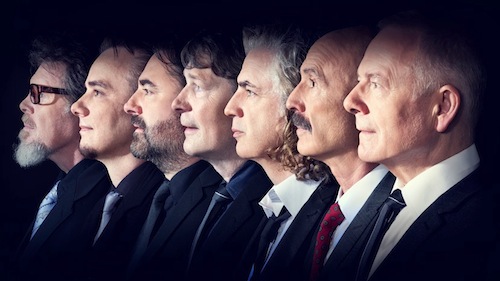Live Review: King Crimson at The Auditorium Theatre
King Crimson
Chicago Theatre
Tuesday, September 10, 2019
When progressive rock titans King Crimson last visited Chicago in 2017, the proceedings at Chicago Theatre went so well that the band released an officially sanctioned live album of the concert. On Tuesday night, the English septet stopped at the venerable Auditorium Theatre for its 2019 Celebration Tour. The group were clearly aiming for similar heights, delivering a three-hour performance that spanned 50 years of musical challenges and thrills since the release of 1969 debut album In the Court of the Crimson King.
Befitting its stature as the standard-bearer for prog-rock, the band left no song in its familiar form. Instrumental excursions during songs like 1970’s “Pictures of a City” and even recent fare like 2016’s “Suitable Grounds for the Blues” were deconstructed and rebuilt to suit the considerable strengths of the current Crim line-up. The band’s spartan stage dressing put emphasis squarely onto the music, without distraction. The only change in lighting was a dramatic shift to deep red light late in the concert, when the band shifted from the moody and moving verses of “Starless” into the song’s sinister-sounding instrumental passage.
Bandleader Robert Fripp was true to form as a reluctant and reticent but virtuosic guitar hero. His position was seated in the second line of players, the better to see the band’s front-line phalanx of thundering and dazzling percussionists. Although Fripp was no flamboyant showman, his performance during instrumentals like “Red” and the slashing, chopping “Larks’ Tongues in Aspic (Part IV)” was focused, meticulous, committed and intense.
The band’s front line was a percussion trio including longtime Crim drummer Pat Mastelotto, veteran member and former Porcupine Tree drummer Gavin Harrison, and 2016 recruit Jeremy Stacey. All three branched out from standard tools and techniques with stunning dexterity, splitting into controlled chaos and returning to fuse into rhythmic unison during percussive showpieces “Hell Hounds of Krim” and “Devil Dogs of Tessellation Row.” Stacey proved equally adept at piano for songs including “Islands” and “Easy Money.” Mastelloto integrated electronic instruments into his rhythms, and had a wall of dangling percussive toys surrounding a large gong behind his kit. Harrison hewed closer to his drum set, masterfully playing beats within beats. The drummers played a rhythmic game of hot potato during “Indiscipline” by tossing tricky shapes at one another in gleeful improvisation, and shared fills that traveled the line from Harrison to Stacey to Mastelotto and back again during “Radical Action II.”
Singer and guitarist Jakko Jakszyk was featured during the band’s most accessible fare, including the retooled “Frame by Frame” where he shared rich vocal harmony with Levin. Jakszyk’s swooning vocal melody during the verses traded space with Fripp’s frenetic guitar during instrumental passages. Jakszyk followed the gentle vocal melody of “Islands” by taking a deft guitar solo. Fripp shifted to mellotron for the song, while winds player Mel Collins took flight on tenor saxophone.
The melodic core of the band was anchored by bassist Tony Levin, who held the low frequencies (and then some) with instruments including electric bass and the 12-stringed Chapman Stick. Levin took a robust pizzicato-plucked solo during “Moonchild,” before bowing his sleek electric upright bass. Meanwhile, Fripp played gliding orchestral string lines with a tone like the one he deployed on David Bowie’s “Heroes.” Levin played slippery rhythms using the Stick during “EleKtriK” and “Indiscipline.” He joined Jakszyk for more vocal harmonies during “Cat Food.” Levin’s melodic bass grounded “Starless” and led into its pensive, clockwork instrumental section that paradoxically made time stand still.
Early bandmember Collins has provided grace and texture since returning to the lineup in 2013, adding saxophones and flute to songs like “Red” as if they’d always belonged there. Collins’ free-jazz baritone sax both heightened the chaos and counterbalance the jagged rhythm of “Neurotica.” His flute adorned Jakszyk’s baroque guitar and vocal during “In the Court of the Crimson King,” earning big cheers from fans of the band’s early albums. The most demonstrative of the players on stage, Collins responded to the ovation with a broad smile and by pumping his fist to his heart in salute. Collins’ baritone saxophone also underscored “Easy Money,” a song that demonstrated precisely how funky a prog band can get outside of 4/4 time.
The set list was a worthy primer for King Crimson’s catalog of 13 albums dating to 2003’s The Power to Believe. For songs like “Suitable Grounds for the Blues” the band exceeded its studio canon to play material heard only on live albums like Radical Action to Unseat the Hold of Monkey Mind. In observance of its 50th birthday as a cornerstone of prog-rock, In The Court of the Crimson King was visited four times. Selections included the dramatic “Epitaph” and Fripp’s slashing, two-ton fretwork during a ferocious encore of “21st Century Schizoid Man.”
After fifty years of history and musical intuition, King Crimson’s imaginative improvisational sense and unparalleled technical acumen leave the band prepared to traverse as much uncharted territory as Fripp still wishes to explore. When the drum trio eventually synched up during that final blast of “20th Century Schizoid Man” for a simultaneous and flawless stick toss mid-song, it was finally acceptable to think for a moment, “Okay. Now, they’re just showing off.”
– Jeff Elbel
Category: Live Reviews













“21st Century Schizoid Man”
Thank you. Updated – Ed